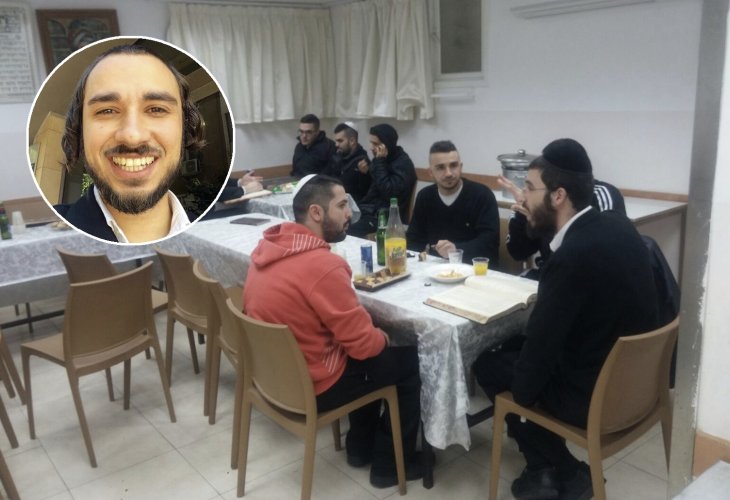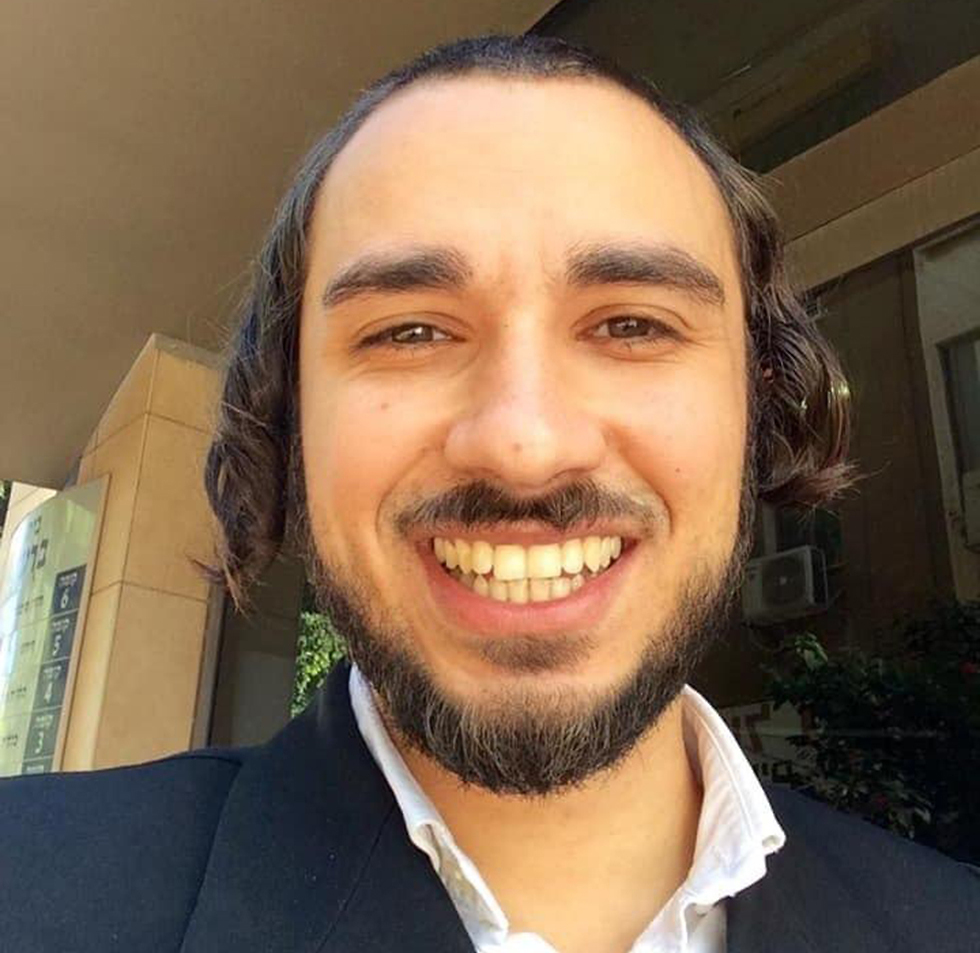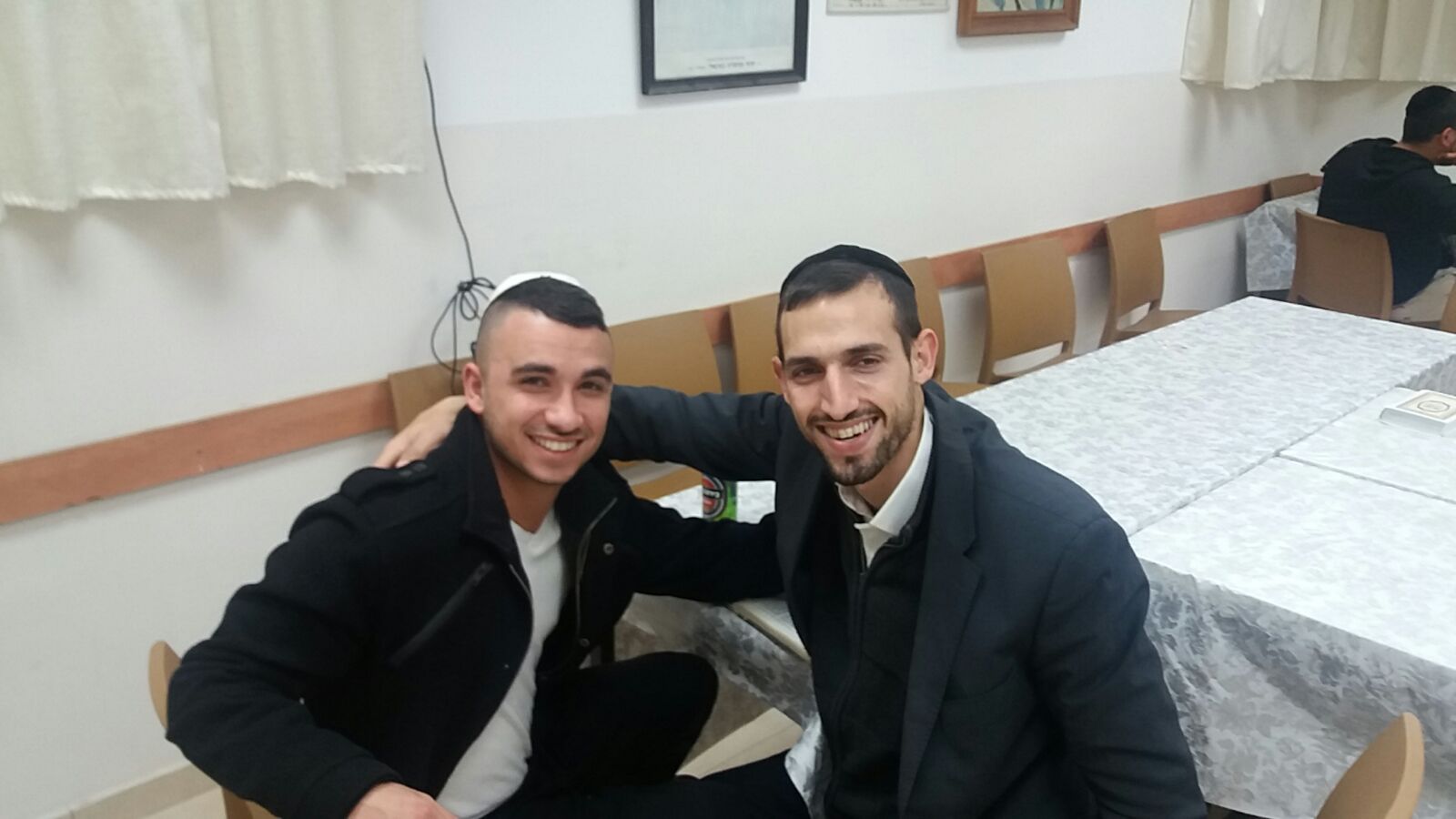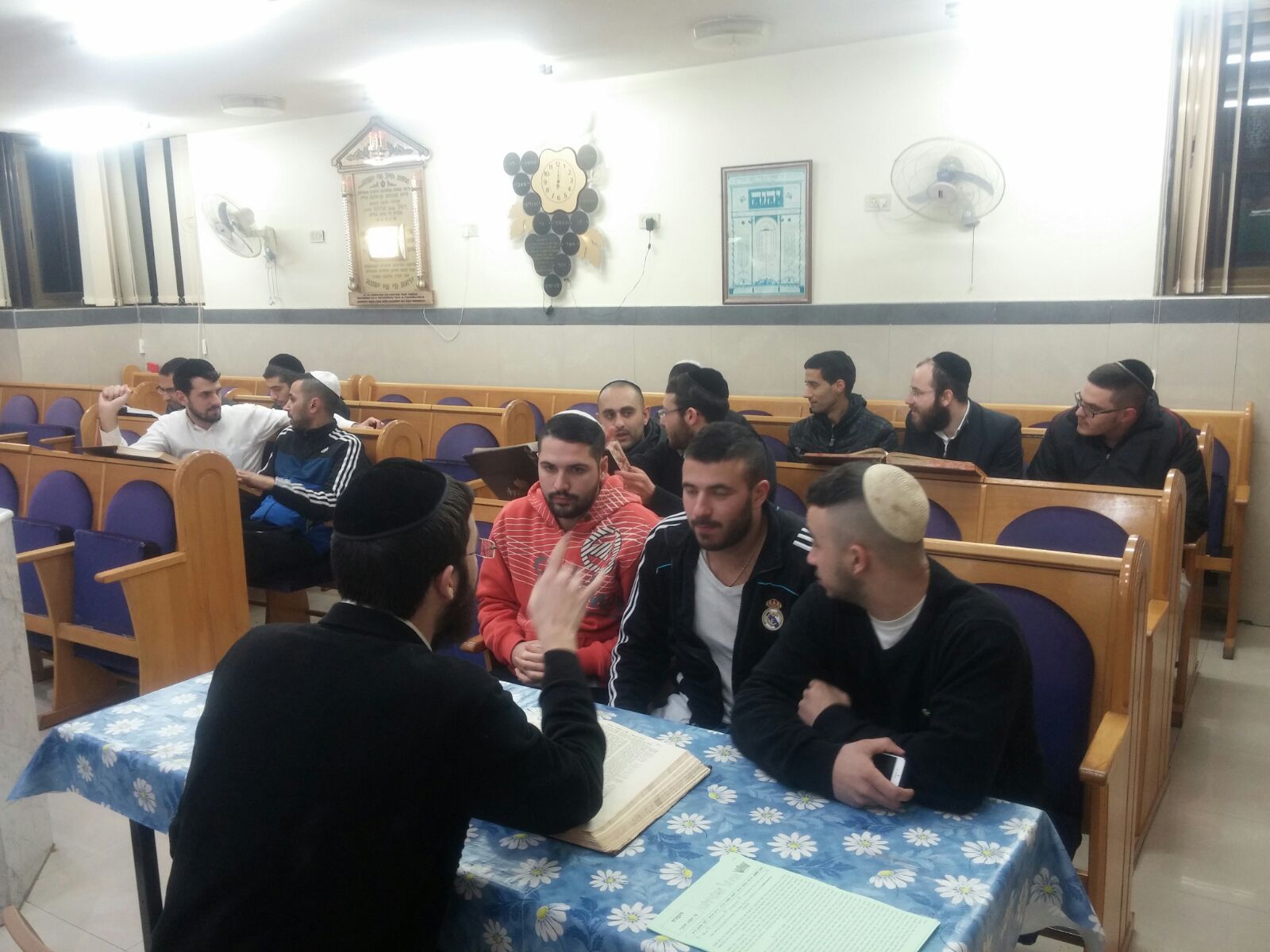Rabbi David Kfir: "Oshri Has Passed Away, and People Don't Understand What He Went Through"
Last week, Oshri Assouline, age 26, passed away after contracting COVID-19. His rabbi, Rabbi David Kfir, reflects: "The first time I met Oshri was at a gas station, with an earring and tattoos, and later a study hall was established thanks to him."
 Rabbi Kfir (at the head of the table) with Oshri z’’l
Rabbi Kfir (at the head of the table) with Oshri z’’l"That moment last week when I heard about Oshri's passing was dreadful," Rabbi David Kfir tells me, his voice trembling. "It's still hard for me to recall it."
Rabbi Kfir pauses for a moment, then continues: "Earlier I saw a report about a young man who had become, according to the hospital, the youngest victim of COVID-19, but I never imagined it was Oshri. And then I heard his name and saw his picture... All at once, I realized it was my Oshri, the young man because of whom the yeshiva I run in Kfar Saba was established, and who had so many merits. He was taken from us. In the first moment, I felt absolute shock; in the second, I broke into tears. It was inconceivable," he describes.
Rabbi Kfir notes that for most people, the name 'Oshri Assouline' doesn't mean much. "Every victim of COVID-19 causes pain and anguish. Everyone understands the tragedy is much greater when it involves a young and healthy person, but they don't realize how many merits he had. No one realizes what kind of struggles Oshri went through in recent years and the immense spiritual strength he used to chart his path to Judaism."
 Oshri Assouline (Photo: From Facebook)
Oshri Assouline (Photo: From Facebook)"He Told Me: 'I Am Not Righteous, You Are Righteous'"
For ten years, Rabbi Kfir has been active in outreach, living in the settlement of 'Zufim,' a mixed religious-secular community. Among other roles, he engages with youth and also manages a yeshiva for teenagers in Kfar Saba.
"The yeshiva was established thanks to Oshri," he confirms, recounting events that happened about five years ago: "During that time, I was going about with a long-held dream to open a yeshiva tailored for teenagers. The desire was there, but starting was not easy, mainly because there weren't any students. I found myself wandering and contemplating for a long time whether to dive in and begin or simply give up. I tried to figure out how to attract youth to study Torah, and thoughts accompanied me everywhere: 'Will I succeed or not? Should I try at all? Is it worthwhile?'
"One day, I arrived at a gas station in the Kfar Saba area, looking for a hot drink, and as I entered the 'Yellow' store, I discovered the cashier was a young man with a cap, an earring, and many tattoos on his body. He approached me with a big, captivating smile. I asked him: 'Righteous one, can you check me out?' And he replied: 'I am not righteous, you are righteous.' A conversation unfolded between us. I am used to developing conversations with teenagers, and so I asked him where he lived, and he told me he resides in Kfar Saba, right across from the synagogue where I pray. At that moment, I decided. I told him: 'I am opening a yeshiva, and you will be the first student to study there. You are invited to come tomorrow.'"
And did he come?
"Yes, Oshri really came. Initially, I hadn't gathered more students, so it was just the two of us in the yeshiva. But he didn't mind; he sat down and simply began to learn."
Rabbi Kfir pauses for a moment and takes a deep breath. "He was very noble, Oshri," he whispers, "very gentle... I felt it from the very first moment. I think initially he didn't even come to the yeshiva because he was interested in learning, but rather because he wanted to show respect to me. Thanks to him, I opened the yeshiva, and I can clearly say that if I hadn't met him, it is doubtful it would have opened."
After Oshri's first visit to the yeshiva, he continued to come again and again. "A close connection developed between us," Rabbi Kfir shares, "and I will never forget his small Peugeot and how he juggled shifts so he could study Torah. Every time I look at Oshri's picture, tears come to my eyes, as I remember the shy smile that always characterized him when he arrived. We also had many talks, and he told me about his father who had returned to Judaism and lives in Bnei Brak. He repeatedly told me: 'My father is a righteous man.' From time to time, he also talked about the tattoos on his body and would always say to me with sadness: 'How will I repent for this? Look at how many sins I've committed.'"
What do you think led him to become closer to Judaism?
"As I mentioned, he initially came just because he was a nice guy, but within four months, a massive change occurred for him: he removed the earrings and started wearing a tzitzit and a kippah.

"I remember that one evening Oshri asked me to accompany him to his cousin's housewarming party; he wanted there to be words of Torah, and when I spoke, he intervened and added more and more to my words. He was entirely holy fire; you could see he not only wanted to learn but also to teach. After a short time, he did the unthinkable and started giving Torah lessons himself. During the shiva, when I went to comfort the family, they told me that in recent years he would sit every morning between work hours and write novel Torah insights on the weekly Torah portion. He left behind 17 notebooks full of Torah insights. It's no surprise that these days the family is trying to donate a Torah scroll in his memory. The desire to commemorate him in such a way is obvious."
"Oshri Demands of Us"
When was the last time you spoke with him?
"I talked to Oshri about three years ago. During that time, he already felt there was no longer a reason to stay in Kfar Saba, and he moved to live with his father in Bnei Brak. We spoke over the phone, and he told me how happy he was in his new life, that he visits different rabbis in Bnei Brak and gives Torah lessons through a Facebook group. Later, indeed, a woman told me she returned to faith and was strengthened thanks to Oshri's lessons. Even in that conversation, Oshri mentioned the issue of tattoos, and he said it bothers him more than anything, and he thinks about it all day. When we finished talking, I wished him success and reminded him that our entire yeshiva was thanks to him. As usual, he was modest and said to me: 'What do you mean? It's definitely not me.'

"Oshri taught me how great the power of our will is," says Rabbi Kfir in conclusion. "He was much younger than me, but still, I learned so much from him and understood how with just a small desire of a Jew, worlds can be illuminated. Think about it – he ascended above carrying with him thousands of hours of spiritual growth and mitzvah acceptance by dozens of youth, all thanks to the small step he took initially when he agreed to be the first student at the yeshiva."
Personally, what is the strongest memory that Oshri has left you with?
Reflecting for a moment before answering, Rabbi Kfir says: "The obligation to insist on every Jewish soul, understanding the tremendous duty we have to recognize the spark and to seize it in time, because you never know where it might lead."
To contact Rabbi David Kfir: 6764615@gmail.com

